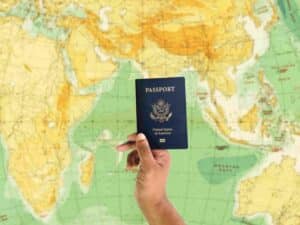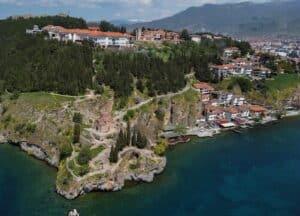Countries around the world offer foreign nationals the chance to become permanent residents and obtain a second passport, often leading to dual nationality, through various means. Some of which include jus sanguinis (citizenship by descent), naturalization, jus matrimonii (marriage), citizenship by investment, and more.
Second citizenship is a legal status in which an individual is legally recognized as a citizen in two countries at the same time. This means the person has rights and responsibilities to each of the countries for which they hold passports.
This guide will take you through everything you need to know about acquiring additional citizenship, including:
What is second citizenship?
Second citizenship or dual citizenship refers to when someone holds legal citizenship in two or more countries simultaneously. It allows individuals to enjoy the rights and responsibilities granted under each country’s dual nationality law.
The Global Intelligence Unit’s report, “The Transformation of Citizenship” has seen perception shift regarding dual citizenship. It used to only be seen as tied to political allegiance but it is now recognized as a strategic asset.
This shift around dual citizenship aligns with trends in global mobility and personal security, especially as a second foreign passport can offer both freedom and protection in volatile times.
It offers people, especially high-net-worth individuals (HNWIs), greater international mobility, access to better economic opportunities and a safety net in times of uncertainty.
What are the benefits of second citizenship?

- Increased global mobility: A second passport can significantly expand your travel options. It allows you to visit, work and even live in more countries without the need for a visa, which simplifies business and leisure.
- Access to education and healthcare: Dual citizenship can grant you access to top-quality healthcare systems and educational institutions. This has the potential to improve your quality of life and offer better opportunities for you and your family.
- Family benefits: When you obtain second citizenship through investment, it often extends to immediate family members. This grants them the same benefits, including freedom of travel, the right to live and work in the country, and access to education and healthcare.
- Business opportunities: Gain access to international markets and financial systems, as well as potential taxation advantages, such as lower income tax rates or exemption from foreign asset reporting in some countries.
- Property ownership: With dual citizenship, you have the right to own and rent property in both countries.
- Enhanced security: When political instability or economic hardship happens in your country of origin, dual citizenship provides a safety net for you and your family.
- Right to vote: As a second citizen, you can vote in elections as well as hold governmental positions.
- Consular protection: A second passport grants access to consular services from both countries, enhancing protection while traveling or working abroad.
How to get a second citizenship?
Dual nationality laws have evolved significantly since the 1930 Hague Convention attempted to standardize citizenship rules and reduce statelessness globally.
Since then, six common ways to get dual citizenship have evolved worldwide and they include birth, naturalization, marriage, descent, investment and exception. Here’s a breakdown of each:
1. Citizenship by Birth
If you were born in a foreign country that grants citizenship by “jus soli” (right of soil), you may hold a claim to acquire citizenship based on simply being born in the country. Typically, when a nation practices jus soli children born within their territory automatically acquire citizenship.
Citizenship by birth is offered either restricted or unrestricted. When there’s no restrictions on citizenship by birth, it means there are no conditions on the parents’ legal status so the child can become a citizen even if the parents are foreign nationals or undocumented at the time of birth.
Restricted citizenship by birth, on the other hand, means certain conditions must be met, generally related to the parents’ nationality, residency or citizenship status, or legal immigration status.
2. Citizenship by Descent
Citizenship by descent is commonly known as “jus sanguinis” (right of blood), whereby an individual is granted citizenship or has the right to claim citizenship through a blood relative who holds citizenship in the country. The acquisition of dual citizenship is based on familial connection rather than place of birth.
These are some of the general conditions of the countries that offer Citizenship by Descent:
- Direct line of descent: Most countries require a direct connection, such as a parent or grandparent, to claim citizenship.
- Unbroken line of citizenship: If an ancestor renounced their citizenship, this may invalidate the claim.
- Proof of ancestry: Applicants must provide birth certificates, marriage records, and other documents proving their connection to the country.
- Residence and language requirements: Some countries, like Hungary, may require language knowledge or proof of ties to the government (e.g., cultural connections).
Popular countries that offer Citizenship by Descent include:
- Italy
- Ireland
- Poland
- Germany
- Greece
- Hungary
- Portugal
- Spain
3. Citizenship by Marriage
Citizenship by marriage refers automatically gaining citizenship in a country by marrying someone who is already a citizen. It has similar conditions to naturalization as there’s often specific requirements that need to be met and a period of residency.
It is often a more streamlined pathway to dual citizenship as the residency period may be reduced and there are often no language proficiency requirements. This makes it a common and attractive option to pursue.
These are some of the countries with the shortest residency period for citizenship by marriage:
- Dominican Republic: Six months
- Brazil: One year
- Spain: One year
- Argentina: Two years
- Portugal: Three years
- Germany: Three years
4. Citizenship by Naturalization

It often entails obtaining a residence permit to transition to permanent residency before applying for citizenship status after completing the required period of residency. It also may come with a language proficiency test or the need to display knowledge of local culture and history.
Keeping those requirements in mind, these are some of the countries with the shortest naturalization periods:
- Argentina Two years
- Peru: Two years
- Paraguay: Three years
- Belgium: Five years
- Sweden: Five years
- Portugal: Five years
As part of the naturalization process, many countries require an Oath of Allegiance, along with language and cultural competency tests.
5. Citizenship by Exception
Citizenship by Exception is the process of acquiring accelerated citizenship at the discretion of a head of state or ruling government body.
There are no concrete guidelines for obtaining or awarding this type of fast-track citizenship; however, the decision usually revolves around making substantial contributions to the country’s development, be it economic, educational, or cultural.
Two great examples include:
- United Arab Emirates: The UAE Executive Regulation of the Federal Law concerning Nationality and Passports introduced new criteria for granting citizenship based on exceptional merit. Experienced individuals in fields such as scientific research, the arts, and medical care may be offered UAE citizenship at the discretion of royal UAE authorities.
- Serbia: The Republic of Serbia has a discretionary program that may grant Serbian citizenship by exception to individuals deemed to have contributed significantly to Serbian society. Considerations can include contributions to education, business, or the possession of substantial assets in the Republic.
This discretionary path is not standardized and falls outside traditional routes defined by most nationality laws.
6. Citizenship by Investment
A few countries have introduced formal Citizenship by Investment (CBI) programs, allowing individuals to acquire a second passport by investment and is a form of economic naturalization that bypasses traditional timelines.
These initiatives typically involve significant financial investments, such as real estate purchases, job creation, or contributions to specific economic sectors.
For instance, the Antigua and Barbuda citizenship by investment program is one of the most affordable dual citizenship programs, with a minimum contribution to the country’s National Development Fund (NDF) of $230,000.
Vanuatu’s citizenship by investment program stands out because it grants citizenship within 60 days to foreign nationals who contribute $130,000 to the country’s government fund.
12 Countries With the Best Second Citizenship Programs
Our report on the rise of dual citizenship shows that it has transformed from what was once a rare legal anomaly into a mainstream global practice. Citizenship is increasingly used as a policy tool for economic, demographic, and geopolitical objectives, while individuals strategically acquire it as an asset for enhanced mobility, opportunity, and protection.
To stay ahead of global trends in mobility and secure your family’s future as well as protect your wealth, explore some of the best citizenship by investment programs (CBI):
1. Antigua and Barbuda

Investment options include:
- $230,000 donation to the National Development Fund
- $300,000 real estate investment
- $1.5 million business investment
- $260,000 University of the West Indies (UWI) Fund investment (only for families of six or more)
2. St. Kitts and Nevis
St. Kitts and Nevis is one of the most established CBI programs. It is known for its strong passport, stable government, and calming island lifestyle. The St. Kitts and Nevis Citizenship by Investment program grants visa-free access to over 150 countries, including key European and Asian nations, making it a great choice for global mobility.
Investment options include:
- $250,000 contribution to the Sustainable Growth Fund
- $325,000 shares in real estate investment
- $600,000 real estate investment in private homes
- $250,000 public benefit investment (infrastructure projects)
3. Dominica

Investment options include:
- $200,000 donation to the Economic Diversification Fund
- $200,000 real estate investment
4. Grenada
Grenada stands out for its warm climate and proximity to the U.S., along with the unique ability to apply for an E-2 visa to the U.S.
Grenada’s Citizenship by Investment program also offers visa-free travel abroad to over 140 countries and is a great fit for those interested in expanding their travel options or business ventures.
Investment options include:
- $235,000 donation to the National Transformation Fund
- $270,000 real estate investment (in shares)
- $350,000 (as a sole owner)
5. Malta

As an EU member state, Malta’s CBI program provides visa-free travel to over 180 countries, including the entire European Union, making it the strongest passport (especially in comparison to popular Caribbean options).
Investment options include:
- €600,000 donation to the National Development and Social Fund
- after 36 months of residency (€750,000 after 12 months of residency)
- €700,000 real estate investment
6. St. Lucia
St. Lucia offers a serene lifestyle with access to stunning beaches, luxury resorts, and a vibrant community. St. Lucia’s Citizenship by Investment program is relatively new but has quickly gained popularity due to its affordable investment options and visa-free access to over 140 countries.
Investment options include:
- $240,000 donation to the National Economic Fund
- $300,000 real estate investment
- $300,000 government bond investment
7. Vanuatu

Investment options include:
- $130,000 donation to the Vanuatu Development Support Program
- $180,000 contribution for a family of four
With so many Caribbean CBI programs available, we have a Caribbean citizenship by investment comparison guide that will help you understand the various investment routes, requirements, and timeframes for citizenship.
8. Turkey
Turkey is a dynamic transcontinental nation bridging Europe and Asia, offering a rich cultural heritage, bustling cities like Istanbul, and a rapidly growing economy.
The Turkey Citizenship by Investment program is one of the most popular globally due to its affordable investment threshold and strategic location. Turkish citizenship provides visa-free access to over 110 countries and serves as an excellent gateway between East and West. Investment options include:
- $400,000 real estate investment (held for minimum 3 years)
- $500,000 bank deposit (held for minimum 3 years)
- $500,000 investment in government bonds (held for minimum 3 years)
- $500,000 capital investment in Turkish companies with job creation
9. Jordan

The Jordan Citizenship by Investment program offers investors a pathway to citizenship in one of the most politically stable countries in the Middle East, with visa-free access to over 50 countries. Investment options include:
- $750,000 bank deposit (non-interest bearing for 10 years)
- $1 million investment in economic projects or companies
- $1.5 million investment in less developed areas of Jordan
10. Egypt
Egypt is a fascinating destination combining ancient history with modern development opportunities, offering access to both African and Middle Eastern markets.
The Egypt Citizenship by Investment program provides investors with citizenship in one of the region’s largest economies, granting visa-free access to over 50 countries and serving as a strategic base for business expansion. Investment options include:
- $250,000 non-refundable contribution to the public treasury
- $300,000 real estate investment
- $350,000 bank deposit (held for 3 years, then refundable)
11. North Macedonia

The North Macedonia Citizenship by Investment program provides investors with a European passport and visa-free access to over 120 countries, making it an attractive option for those seeking European residency rights and business opportunities in the Balkans. Investment options include:
- €200,000 donation to the Public Investment Fund
- €400,000 investment in companies or real estate projects that create jobs
12. Moldova
Moldova is a charming Eastern European nation known for its wine culture, affordable cost of living, and developing economy.
The Moldova Citizenship by Investment program offers one of the most cost-effective routes to European citizenship, providing visa-free access to over 120 countries, including the Schengen Area. The program is particularly attractive for investors seeking affordable European citizenship options. Investment options include:
- €100,000 non-refundable contribution to the Public Investment Fund
- €250,000 real estate investment in approved projects
Which countries offer second citizenship to US citizens?
Ever wondered whether you can have two passports as a US citizen? Well, the good news is that the United States government allows and recognizes dual nationality! This means you can hold a passport from the US and a passport from another country simultaneously. You don’t need to renounce your US citizenship when you get dual citizenship.
You do, however, need to use your US passport when re-entering or leaving the United States.
The only potential downside might be conflicting obligations such as military service, jury duty, or dual taxation, depending on the laws of each country.
It’s important to note that while the US allows dual citizenship, the laws around this may not be the same in the prospective country. Here are the countries (according to continent) where US citizens can have dual nationality:
Region | Countries that allow dual nationality to US citizens |
Europe | Albania, Belgium, Cyprus, the Czech Republic, Denmark, Finland, France, Germany, Greece, Hungary, Iceland, Italy, Ireland, Latvia, Luxemburg, Malta, Norway, Portugal, Romania, Russia, Serbia, Slovenia, Sweden, Turkey, the United Kingdom |
Americas | Argentina, Belize, Bolivia, Brazil, Canada, Chile, Costa Rica, Mexico, Peru |
Africa | Algeria, Angola, Benin, Egypt, Libya, Malawi, Mauritius, Nigeria, South Africa, Tunisia |
Asia | Armenia, Bangladesh, Pakistan, the Philippines, Sri Lanka |
Middle East | Israel, Lebanon, Syria |
Oceania | Australia, New Zealand, Vanuatu |
Caribbean | Antigua and Barbuda, Barbados, Dominica, Grenada, Jamaica, St Kitts and Nevis, St Lucia |
How Can Global Citizen Solutions Help You?
Global Citizen Solutions is a boutique migration consultancy firm with years of experience delivering bespoke residence and citizenship by investment solutions for international families. With offices worldwide and an experienced, hands-on team, we have helped hundreds of clients worldwide acquire citizenship, residence visas, or homes while diversifying their portfolios with robust investments.
We guide you from start to finish, taking you beyond your citizenship or residency by investment application.

Frequently Asked Questions about Second Citizenship
What is second citizenship?
Second citizenship, also known as dual citizenship, is a legal status in which an individual is recognized by two countries as a full citizen simultaneously.
Second citizenship affords someone the same rights as any other citizen of the host country, including living and working in the country.
How much does it cost to get dual citizenship?
The cost of obtaining dual citizenship varies widely, primarily through Citizenship by Investment (CBI) programs. These involve investing in a country’s economy and costs can range from as low as $100,000 to as high as $2,500,000.
What is the cheapest second citizenship program?
Dominica and St. Lucia currently offer the most affordable dual citizenship programs, starting from $100,000 for a single applicant through a government donation.
What are the benefits of having a dual citizenship?
Dual citizenship offers benefits such as:
- Greater global mobility through visa-free travel abroad
- Access to better education opportunities and healthcare facilities
- Diversification of financial and business opportunities
- Personal security
What are the risks of obtaining a dual citizenship?
While dual citizenship has more benefits than risks, it can bring potential double taxation, restrictions on holding government jobs, and potentially less consular access in some jurisdictions.
How do I apply for a dual citizenship?
The process of obtaining dual citizenship varies from country to country and depends on whether you do so through naturalization, descent, marriage or investment.
It may require meeting residency requirements, passing naturalization tests, providing proof of ancestry under jus sanguinis, or making financial contributions under CBI programs.
Does the United States allow dual citizenship?
Yes, you can hold dual citizenship of the United States and another country provided that you:
- were born in the United States and you have a parent that is a citizen of another country.
- were born outside the United States to 1 or 2 parents that were U.S. citizens at the time of your birth.
- naturalize as a U.S. citizen while keeping the nationality of another country.
Does the United Kingdom allow dual citizenship?
Yes, citizens of the United Kingdom can hold dual citizenship in another country without losing their British citizenship.
Can you have dual citizenship with Canada?
Yes, Canada allows dual citizenship, meaning Canadian citizens can acquire a second nationality without losing their Canadian status.
Also, foreign nationals can get Canadian citizenship while retaining original foreign citizenship status, provided their home country also permits dual nationality.
There is no requirement to renounce your existing citizenship when getting Canadian citizenship.
What are the tax implications of a dual citizenship?
Dual citizenship can potentially bring with it double taxation, meaning the individual is taxed on the same income twice.
However, some countries often form bilateral tax treaties or agreements to mitigate this. These may include provisions for tax credits or exemptions to prevent or reduce dual taxation.
Can people with Indian citizenship become dual nationals?
No, India does not allow dual citizenship. Under Indian law, acquiring foreign citizenship automatically results in the loss of Indian citizenship.
However, India offers an alternative called Overseas Citizenship of India (OCI), which provides many benefits but it is not equivalent to full dual citizenship.


